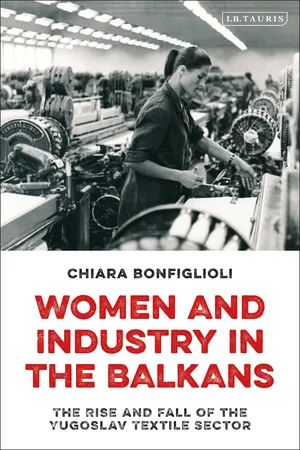
eBook - ePub
Women and Industry in the Balkans
The Rise and Fall of the Yugoslav Textile Sector
- 232 pages
- English
- ePUB (mobile friendly)
- Available on iOS & Android
eBook - ePub
Women and Industry in the Balkans
The Rise and Fall of the Yugoslav Textile Sector
About this book
Women's emancipation through productive labour was a key tenet of socialist politics in post-World War II Yugoslavia. Mass industrialisation under Tito led many young women to join traditionally 'feminised' sectors, and as a consequence the textile sector grew rapidly, fast becoming a gendered symbol of industrialisation, consumption and socialist modernity. By the 1980s Yugoslavia was one of the world's leading producers of textiles and garments. The break-up of Yugoslavia in 1991, however, resulted in factory closures, bankruptcy and layoffs, forcing thousands of garment industry workers into precarious and often exploitative private-sector jobs. Drawing on more than 60 oral history interviews with former and current garment workers, as well as workplace periodicals and contemporary press material collected across Croatia, Macedonia, Serbia, Bosnia-Herzegovina and Slovenia, Women and Industry in the Balkans charts the rise and fall of the Yugoslav textile sector, as well as the implications of this post-socialist transition, for the first time.
In the process, the book explores broader questions about memories of socialism, lingering feelings of attachment to the socialist welfare system and the complexity of the post-socialist era. This is important reading for all scholars working on the history and politics of Yugoslavia and the Balkans, oral history, memory studies and gender studies.
In the process, the book explores broader questions about memories of socialism, lingering feelings of attachment to the socialist welfare system and the complexity of the post-socialist era. This is important reading for all scholars working on the history and politics of Yugoslavia and the Balkans, oral history, memory studies and gender studies.
Frequently asked questions
Yes, you can cancel anytime from the Subscription tab in your account settings on the Perlego website. Your subscription will stay active until the end of your current billing period. Learn how to cancel your subscription.
At the moment all of our mobile-responsive ePub books are available to download via the app. Most of our PDFs are also available to download and we're working on making the final remaining ones downloadable now. Learn more here.
Perlego offers two plans: Essential and Complete
- Essential is ideal for learners and professionals who enjoy exploring a wide range of subjects. Access the Essential Library with 800,000+ trusted titles and best-sellers across business, personal growth, and the humanities. Includes unlimited reading time and Standard Read Aloud voice.
- Complete: Perfect for advanced learners and researchers needing full, unrestricted access. Unlock 1.4M+ books across hundreds of subjects, including academic and specialized titles. The Complete Plan also includes advanced features like Premium Read Aloud and Research Assistant.
We are an online textbook subscription service, where you can get access to an entire online library for less than the price of a single book per month. With over 1 million books across 1000+ topics, we’ve got you covered! Learn more here.
Look out for the read-aloud symbol on your next book to see if you can listen to it. The read-aloud tool reads text aloud for you, highlighting the text as it is being read. You can pause it, speed it up and slow it down. Learn more here.
Yes! You can use the Perlego app on both iOS or Android devices to read anytime, anywhere — even offline. Perfect for commutes or when you’re on the go.
Please note we cannot support devices running on iOS 13 and Android 7 or earlier. Learn more about using the app.
Please note we cannot support devices running on iOS 13 and Android 7 or earlier. Learn more about using the app.
Yes, you can access Women and Industry in the Balkans by Chiara Bonfiglioli in PDF and/or ePUB format, as well as other popular books in History & Eastern European History. We have over one million books available in our catalogue for you to explore.
Information
Table of contents
- Cover
- Half-Title
- Title
- Contents
- List of figures
- Acknowledgements
- Introduction
- 1 Industrializing Yugoslavia: Market socialism and textile workers’ structure of feeling
- 2 Being a seamstress in Yugoslav times: The ‘working mother’ gender contract
- 3 Labour after Yugoslavia: Post-socialism and deindustrialization in the textile sector
- 4 Workers’ structure of feeling after deindustrialization: Loss, nostalgia and belonging
- 5 Beyond nostalgia: Workers’ struggles for social justice and everyday resilience
- Conclusion
- Bibliography
- Index
- Copyright